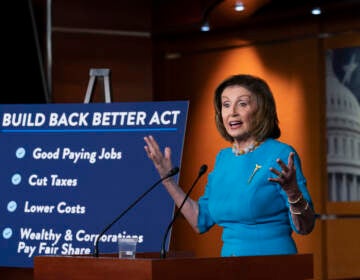Impeachment over, Pelosi and N.J. House Dems focus on lowering prescription drug costs
The roundtable discussion was a re-promotion of the bill H.R.3, more formally known as the Elijah E. Cummings Lower Drug Costs Act.
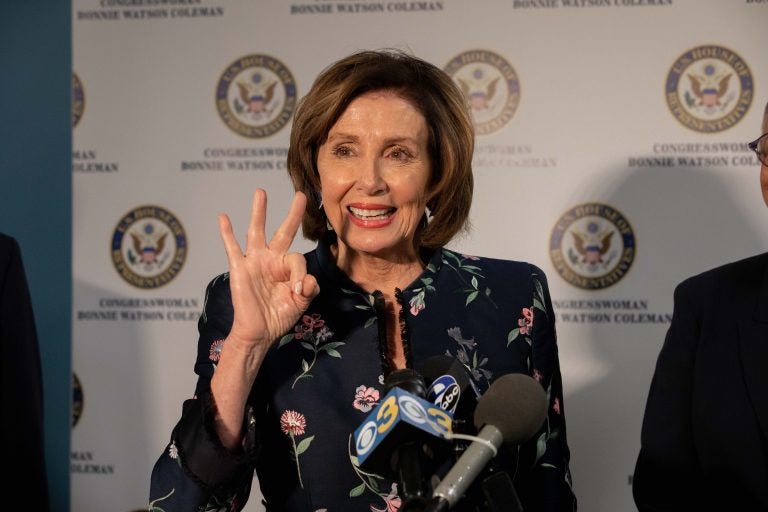
Speaker Nancy Pelosi holds up three fingers in reference to H.R. 3, the Elijah E. Cummings Lower Drug Costs Now Act in Trenton, NJ. (Becca Haydu for WHYY)
Just a few days ago, House Speaker Nancy Pelosi made viral waves by tearing apart a copy of President Donald Trump’s State of the Union speech. Saturday, she was at a community health center in Trenton, touting a prescription-drug measure that got a brief mention in that same speech.
In what appeared to be an attempt to get back to business after several months focused on the impeachment process, Pelosi attended a roundtable discussion at the Henry J. Austin Health Center with three House colleagues, New Jersey Democrats Bonnie Watson Coleman, Donald Norcross, and Frank Pallone.
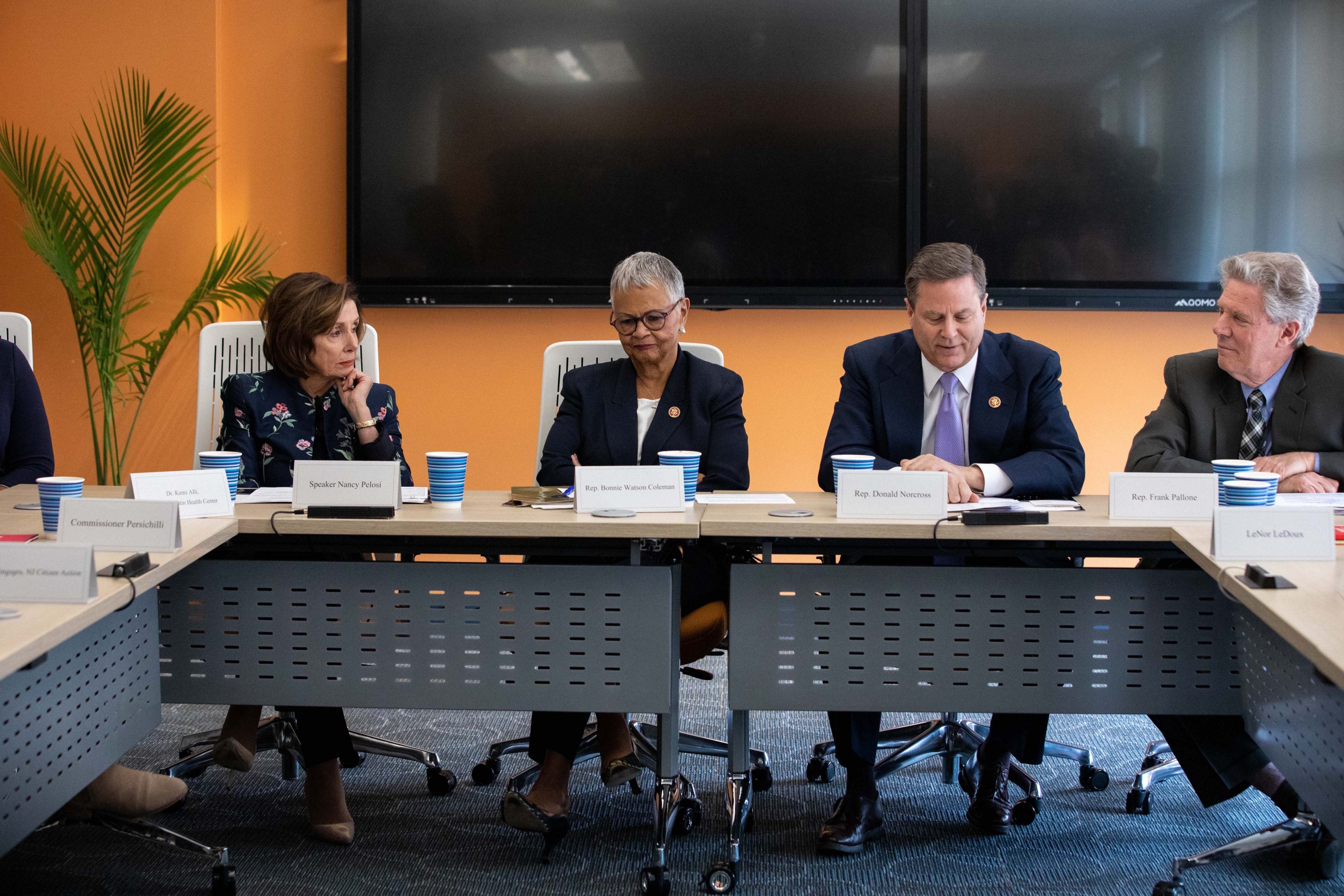
The discussion was a re-promotion of the bill known as H.R. 3, the Elijah E. Cummings Lower Drug Costs Act. During Tuesday night’s State of the Union, Trump said that if a bipartisan bill focused on reducing prescription drug prices passes both the Senate and the House, he would “sign it into law immediately.”
After that statement — which was met with cheers and claps — a handful of House Democrats stood up holding three fingers in the air chanting “H.R. 3,” interrupting the president for a few moments.
WATCH: Democrats chant "HR 3," referencing bill on drug prices, in response to President Trump's call for legislation to lower prescription drug prices. pic.twitter.com/zqbUvoldWB
— NBC News (@NBCNews) February 5, 2020
If passed, H.R. 3 would give Medicare the power to negotiate lower drug prices for at least 25 medications. It also would allow private insurance to be a part of those plans. The legislation says the prices Americans pay will be no more than 120% of the average prices in comparable countries, such as Australia, France, Germany, Japan and the United Kingdom.
Pallone said that, if enacted, the legislation could mean some people paying half what their prescriptions cost now. It would also cap the out-of-pocket limit at $2,000 for Medicare beneficiaries.
“It will produce great savings for the federal government and for individuals and for businesses that provide health insurance for their workers,” Pelosi said. “Nothing this big has happened since the conception of Medicare.”
She said the half-trillion dollars in savings would be used to pay for Medicare dental, hearing and vision benefits.
The measure is currently stalled in the U.S. Senate, where Majority Leader Mitch McConnell said in September, “Socialist price controls will do a lot of left-wing damage to the health care system. And of course we’re not going to be calling up a bill like that.”
Lowering health care costs was one part of the “For the People” agenda many Democrats ran on in the 2018 midterm election, when the party took back control of the House of Representatives and gained four congressional seats in New Jersey.
For Watson Coleman, the cost of medication recently became quite personal. Last year, she was diagnosed with cancer. To beat it, she needed to have uncomfortable and tiring infusions.
“I needed to be focused on being positive and getting better, not how much I’d be billed or if I should pick a cheaper treatment path,” said Watson Coleman, who serves on the House Appropriations Committee. “People who rely on medication, whether it’s for a sudden illness or a chronic condition, should not wonder how they are going to pay for it.”
On Saturday, she and her colleagues did hear from some constituents who have had to think of how to pay for expensive health care costs.
LeNor LeDoux of Burlington became her mother’s primary caregiver in 1984 and stayed in that role until her mother died in 2002. LeDoux’s mother had trouble affording the high costs of her prescription medications. As the only person her mother could rely on, LeDoux ended up subsidizing those costs, which eventually rose so high she entered bankruptcy.
She lost her home, and for eight winters went without heat, gas, and electricity.
LeDoux told an emotional story about arriving at her mother’s apartment one day to find her semiconscious. She’d had a severe hemorrhage the night before.
“As I sat there holding her, waiting for the ambulance to arrive, she was just slipping in and out of consciousness, and every time she’d come back to me, she’d say, ‘Let me go, just let me die. It’s costing you too much to keep me here,’” LeDoux recalled.
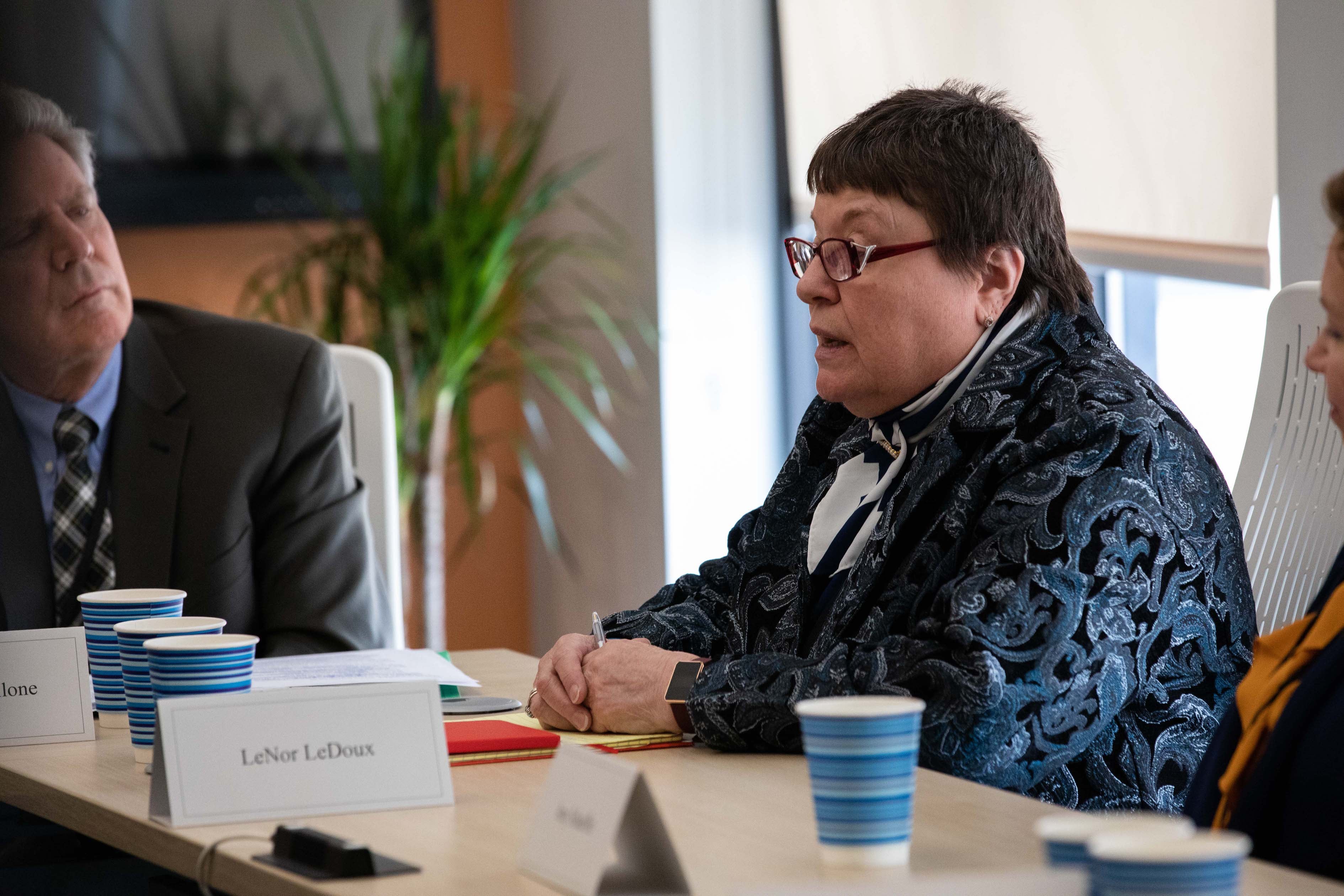
She said the cost of life-saving medications should not be a red or blue issue. She wants to see lawmakers from both sides of the aisle come together to pass H.R. 3.
“The preamble to the Constitution guarantees us that it will promote the general welfare,” LeDoux said. “Well, it seems lately we are kind of falling short in that department, and I certainly consider affordable medications to be a part of the general welfare.”
Those attending the discussion also heard from Lisa Matthews and her 22-year-old son Jared Schechtel, who has Crohn’s disease and an extremely rare autoimmune disorder, opsoclonus- myoclonus syndrome. Some of his hospital stays for the autoimmune disorder have cost a half-million dollars.
Every eight weeks, Schechtel has to get Remicade infusions that cost $4,000 each visit. He has health insurance through his father, who’s on a plan through the Affordable Care Act. Schechtel said without that insurance — which he’ll lose when in four years, when he turns 26 — he’d probably be bankrupt.
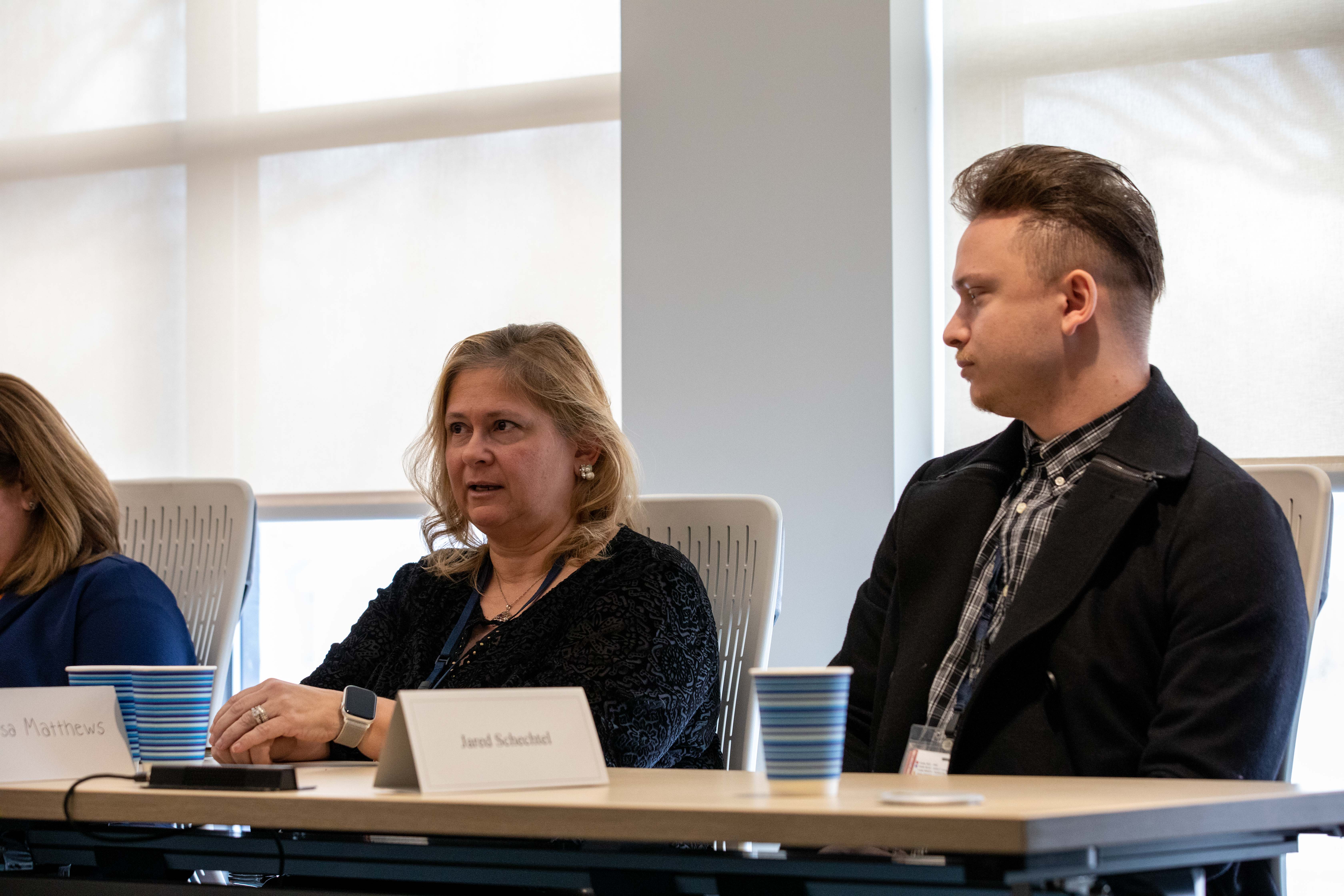
Pelosi ended the roundtable by reminding those in the room that the president had originally supported bipartisan legislation related to lowering medication prices. During his 2016 campaign, Trump said he would “negotiate like crazy.”
“Until something happened,” Pelosi said.
“If you don’t have the negotiation, you don’t have the leverage,” she said. “‘I’m gonna negotiate like crazy’ maybe means, ‘I’m not going to negotiate at all.’ I don’t know what it means, but the fact is that this is intended to be a priority … a unifying one, and we have to have it.”
Talking education at the State of the Union
During Tuesday’s speech, the president called Philadelphia’s public schools an example of “failing government schools.”
He then announced that fourth-grader Janiyah Davis would receive a scholarship — personally paid for by Secretary of Education Betsy DeVos — so she could attend the school of her choice. But it turned out the girl actually attends one of the most prestigious charter schools in the city, and that her education is paid for through property taxes, as first reported by the Philadelphia Inquirer.
After Saturday’s roundtable, Pelosi and the New Jersey representatives fielded press questions about the topic and the president’s use of the expression “government schools.”
“Public education in America is the most valuable force for democracy,” Pelosi said. “…For [Trump] to start off with government schools, which is a term in a certain crowd in our country, is to undermine the system of public education in our country.”
Stephanie Davis, Janiyah Davis’ mother, told the Inquirer she was surprised that Janiyah received a scholarship. Although she and her daughter were invited to attend the State of the Union, she wasn’t aware that they would be named during the president’s hour-long speech.
Janiyah Davis attends Math, Science and Technology Community Charter School III, which opened in the fall in a brand new facility in Northeast Philadelphia. Stephanie Davis said she’s unsure if she wants to take Janiyah out of that school just yet.
“I don’t view MaST as a school you want to get out of at all. I view it as a great opportunity,” Davis told the Inquirer.
On Saturday, Pelosi said, “[With] the charter schools, some work and some don’t, and they should be given a chance. But for him to be calling them government schools, as if that was a denigration of something so fundamental of the well-being of our children, the competitiveness of our nation, and the respect for teachers across the country.”
Norcross added: “The idea of calling it a ‘government school’ is where this all begins. The fact of the matter is you walk out of the door here and you have some of the finest schools, New Jersey government schools have the best outcomes in the United States of America. We are doing well. We can do better. But in this case, it was just propping somebody up to make a story sound good, which it ended up being the exact opposite.”
WHYY is your source for fact-based, in-depth journalism and information. As a nonprofit organization, we rely on financial support from readers like you. Please give today.




